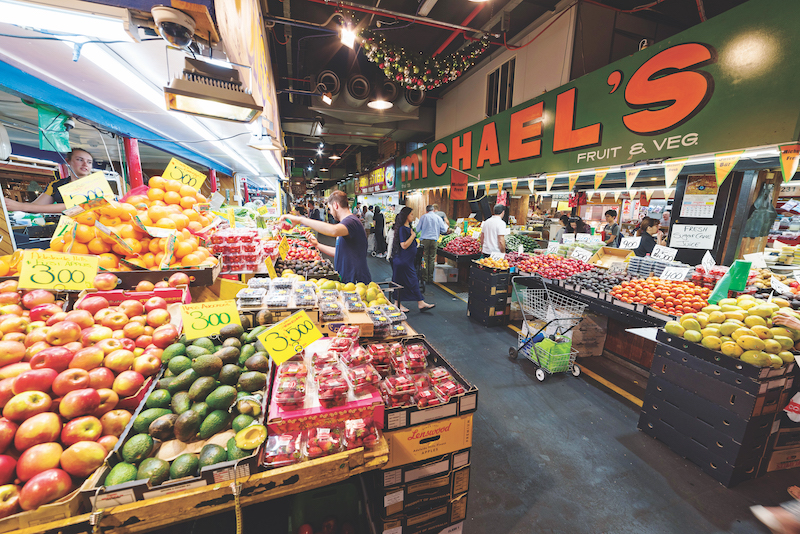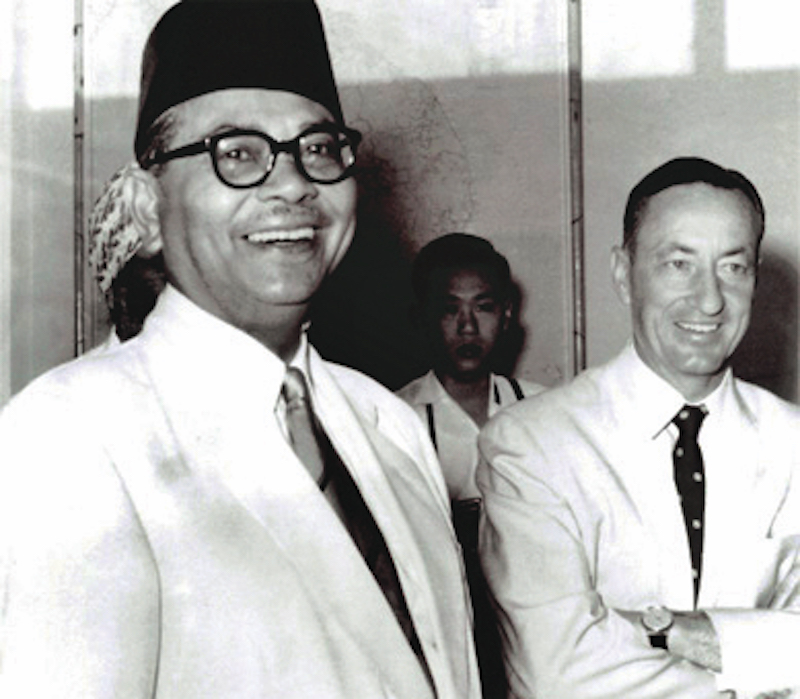
As a proud native of Adelaide, Lee is quite familiar with the agricultural produce of South Australia and enjoys extolling its virtues (Photo: SooPhye)
In the 66 years that Malaysia and Australia have enjoyed a diplomatic relationship, the exchange of information, culture and people has been immense.
Across industries such as manufacturing, trade, tourism and agriculture, the two nations have derived much from each other, establishing a truly symbiotic relationship. For example, in Malaysia, there is a strong demand for Australian fresh produce and wine, while we dare say some of our prized durians (although likely in frozen form) have made it safely to our neighbours Down Under.
As a proud native of Adelaide, the Australian High Commissioner to Malaysia, His Excellency Dr Justin Lee, is quite familiar with the agricultural produce of South Australia and enjoys extolling its virtues. The recent Gourmet South Australia campaign, which saw a capsule collection of products from the state on sale at select local supermarkets, was the perfect project to greet Lee, who arrived in Malaysia in July.
“South Australia is my home state, so I’m very familiar with its gourmet products,” Lee begins eagerly. No bias at all, then? He laughs. “Honestly, the gourmet food industry in South Australia has a wonderfully global heritage, but that is innovated in Australia. The gourmet heritage is one thing — the other is the clean, green aspect, relating to our soil and the sustainable manner in which our seafood is caught. Given that consumers these days are looking for premium products, interesting items that are home-made and ingredients that are organic and healthy are the focus of South Australian products.
“Of course, all the states of Australia produce excellent food and great wine, but what’s common these days, and that we seek to promote because it’s a genuine thing, is a food heritage built on our migrant communities, a fusion with Australian innovation, plus the clean, green sustainable approach. We want to do promotions around what Australia has to offer in the premium, organic, high-quality food space. We recognise that there is a market in Malaysia for this and that Australia is a good provider.”
147104264_l.jpg

As you can already tell, Lee takes food quite seriously and, as a diplomat, has undoubtedly witnessed first-hand how it brings people together. In the case of Australia and Malaysia, it is a pivotal aspect of a comprehensive partnership that provides both nations with a chance to enhance trade relations in, among other areas, the agricultural sector. Time is money? Yes, but so is food, and there is no better partner than Malaysia, whose food culture is diverse and profound, with which to establish a trade relationship of this nature.
“Australia has a real strength in agriculture and fisheries, and where we’d like to take our trade are the complementarities between the two markets,” Lee says. “We know there is a strong consumer demand here for high-quality food products, but we also have a strong interest in value-adding, which means, how can we support the Malaysian food manufacturing industry with Australian products?”
Lee carries the mantle of a diplomatic relationship that has been in existence for many years. Constitutional developments in 1955 indicated that the Federation of Malaya was heading towards self-government and independence from British rule, at which point Australia’s then Minister for External Affairs Richard Casey declared that it was appropriate and desirable to have a full-time representative in Kuala Lumpur.
Tom Critchley was appointed Australia’s first Commissioner in Malaya on Dec 7, 1955, but it would take almost a year for us to reciprocate — Datuk Nik Kamil Mahmood established the first Malayan commission in Canberra on Nov 20, 1956. Critchley became a close friend of our prime minister at the time, Tunku Abdul Rahman, and would become the only Australian diplomat to be honoured with the title of Datuk.
But even before the Commonwealth of Australia and the Federation of Malaysia were in existence, the communities of both nations had already made contact. In 1606, Spanish explorer Luis Vaez de Torres sighted Malay boats traversing the Gulf of Carpentaria. These boats were likely to have brought fishermen from the eastern Indo-Malaysian archipelago — historical records indicate 18th-century trade relationships with indigenous Australians, which have left imprints of the Malay lingo on Aboriginal languages in the far north. In the 19th century, Malays became part of Australia’s burgeoning pearling industry. By 1900, before Japanese pearl divers came to dominate the industry, Malay divers were the majority group, with almost 500 living and working in and around Broome, Western Australia.
That remains the strongest element connecting both Malaysia and Australia — the people, their ties to both nations and how that inter-connectedness has been mutually beneficial across so many generations. “The number of Malaysians who have come to Australia — whether through the original Colombo Plan or, more recently, through those who completed their education and stayed ... Australia is a migrant nation, Malaysians included, and from a people-to-people level, the ties are immense. We all have friends and family in both countries, and that brings us back to the food connection: Malaysians have brought their food heritage with them and innovated to take that further in Australia.”
intro-tunku-abdul-rahman.jpg

A career diplomat who has always harboured an interest in Australia’s neighbours, Lee’s postings in Papua New Guinea, Indonesia and Bangladesh have given him a firm understanding of the region’s cultural and economic nuances as well as a chance to better understand the many communities that have made Australia home. He brings to his present role a worldly outlook, along with a razor-sharp focus on delivering on issues that both governments see as priority. Picking ourselves up after the pandemic, naturally, is imperative.
“We’re all dealing with Covid-19, so the immediate priority for me is for our governments to work together on our respective recoveries — whether it’s to cooperate with the Malaysians authorities on the public health impact or economic recovery,” he says. “In addition, how we can support one another’s economies to get out of this, for example, and how we can create more jobs. It is important to keep markets open, to keep trading and to keep on encouraging investment.
“The implementation of our comprehensive partnership deal is also a priority, and this includes a number of sectors such as digital technology, e-commerce and a whole range of industries where we can strengthen our relationship further. On top of that, I am focused on continuing to push forth the people-to-people relations between our two countries. At the moment, the closed borders make travel very limited and we’ll be looking at how we can resume this, how we can help students get back into Australia or remain there — there are lots of issues on the agenda for me to take forward in the time I am here.”
As a foodie — he is part-Asian after all — Lee is looking forward to eating his way through Malaysia. Owing to pandemic-related restrictions that have been in place for much of the year, he has not been able to eat out very much and sample, at least for a start, what the Klang Valley’s epicurean scene is like. “I did have some Musang King durian, though; it was one of the first things I tried,” he laughs, but diplomatically says nothing about how much he enjoyed it. “I’m eager to try local fruit and vegetables, traditional cuisine and, of course, the street food — hopefully, I will be doing more of that soon enough. Malaysia also has a multicultural fusion of cuisines, which is something in common with Australia. That’s why I think there is so much opportunity for exchange between the two nations, especially in food products.”
image001.jpg

Leaving Kuala Lumpur, where the Australian High Commission is based, and heading out to explore other states is something Lee is most looking forward to doing. Rather than lump it in the “holiday activities” section of things to do in Malaysia, he considers these local sojourns an important aspect of his job as high commissioner. “That’s always been the favourite part of my postings, to get out and meet the people, see what their lives are like,” he shares. “And it’s great to tell them directly, ‘Okay, well, this is what Australia is like.’ Some people may not get the chance to travel Down Under, so they rely on us to tell them what it is like and maybe challenge some of their stereotyped ideas.”
Being able to communicate what we love about our country is something we all like to do as citizens, and Lee has the added opportunity of establishing lasting partnerships between governments that clear the path for even more opportunities for exchange. “What I’ve enjoyed most about it is being able to achieve positive outcomes for both countries, where we can improve understanding, bring people together and set up something practical and tangible,” he says thoughtfully. “It’s why I’m so enthusiastic about the job — if we can promote an Australian company that might not have the exposure here or do the same for a Malaysian company in Australia, that would be great! We see ourselves as facilitators, and setting people up together and seeing what comes out — this is of most interest to me.”
There are downsides to the job, though, which have been exacerbated by the pandemic. “It’s always challenging to be far from family, and this applies to anyone working away from home. The separation is also made harder by Covid-19, as we can’t travel as easily as we normally would,” he says wistfully. Lee is in Malaysia with his spouse; his two children, aged 21 and 23, remain in Australia.
Try as we may, there is no extracting what his favourite or most memorable posting is. “It’s always the one I’m in now — that’s always my current favourite, because it’s the challenge of where you are at the moment that’s most compelling,” he smiles. “So far, all of the countries I have been to are neighbours of Australia and have always had close connections with us, and every place I’ve stayed in has been wonderful.” Because he has spent the longest period of his career in Indonesia — 10 years — he can speak Bahasa Indonesia; now he is watching the daily news in Bahasa Malaysia to get the local parlance just right.
It does seem like Malaysia might just be the perfect posting for Lee, whose long list of academic qualifications include foreign affairs and trade, jurisprudence and philosophy. Most importantly, he likes to eat, enjoys cycling (the workout du jour of many KLites) and can handle the amount of chilli we put in our food — he should fit right in, we joke. Here is another interesting anecdote that further connects Lee to Malaysia: Adelaide and George Town, Penang — where Lee has distant family members — formalised links as sister cities in 1973, and the South Australian capital is actually home to many well-known Malaysian-Australians such as Australian Idol winner and Eurovision entrant Guy Sebastian, celebrity chefs Adam Liaw and Poh Ling Yeow, and Labour Senator for South Australia Penny Wong.
Obviously, Lee is eager for Australian borders to open so that tourism between the two nations is once again possible. It also means his children will be able to visit. For Malaysian foodies preparing to head over to Australia, though, Lee has some very important advice on how to eat like an Aussie. “Thinly spread Vegemite should always be with butter and hot toast; fairy bread must have a total covering of hundreds and thousands with no margarine showing at all; and there’s nothing better to have on Australia Day than a Lamington.”
Eating tips from the high commissioner himself — it does not get more authentic than this.
This article first appeared on Nov 8, 2021 in The Edge Malaysia.


